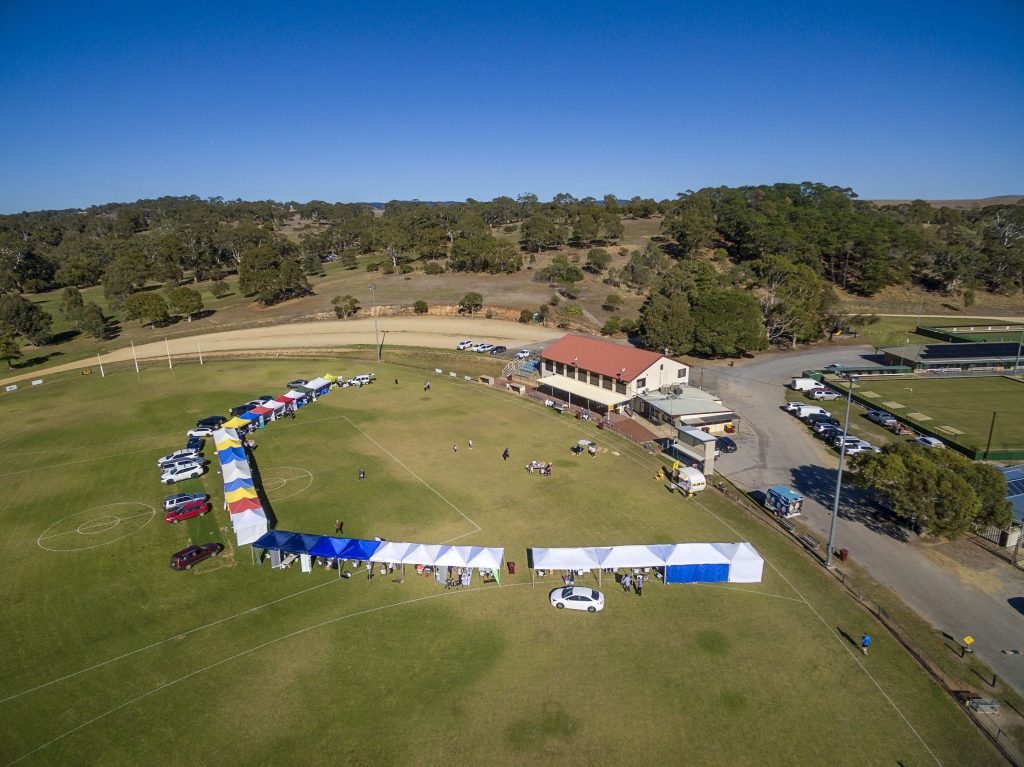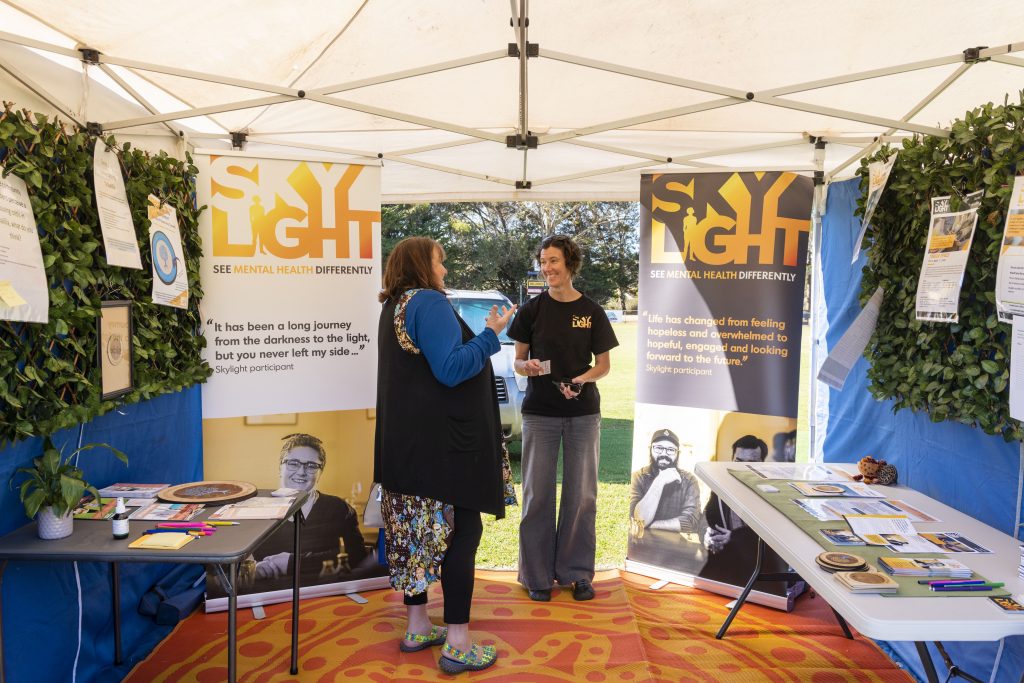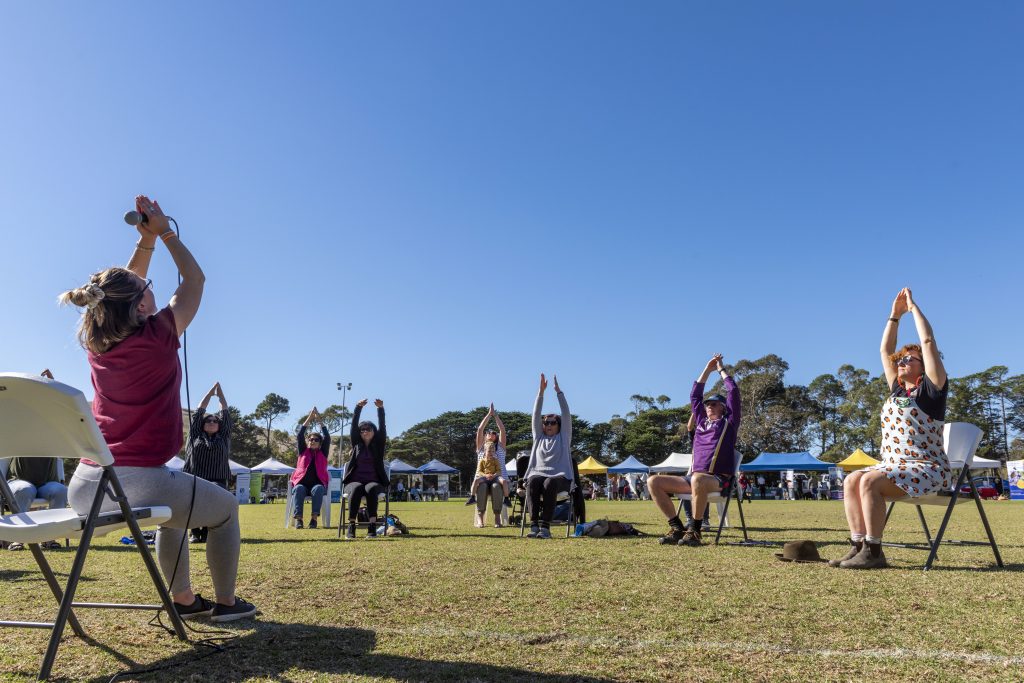Foundation for Rural & Regional Renewal (FRRR)
Nestled beside the Rocky River and amid the undulating hills of the Southern Flinders Ranges in South Australia, Laura is a lively, artistic rural community with around 720 residents. The Laura Fair, inaugurated in 1980 to foster art and culture in the region, has been held without interruption until the COVID years.
The Fair is a major highlight for the region and normally taking place over two days at the beginning of April, typically attracting 10,000 to 15,000 patrons. The event is entirely driven by a small volunteer committee and a large contingent of casual volunteers who assist with various aspects of the event.
The event significantly benefits local businesses economically and serves as a primary fundraising platform for numerous local community groups. This family-oriented fair offers a delightful rural experience with great food and coffee, artisan market stalls, entertainment and more throughout the weekend.
To decrease the event costs of hiring equipment, including chairs, the fair committee was supported through a $4,590 Rebuilding Regional Communities grant to buy 200 stackable outdoor chairs for use at the fair and other community events, beginning with the 2024 Fair, which aimed to foster community connections post-pandemic and reinvigorate the event.
The Fair took place 13-14 April and attendees enjoyed a Street Parade, vintage cars, SES, CFS and local business floats and live entertainment, as well as roving performers and buskers, Sideshow Alley, food stalls, an Art Gallery exhibition and more than100 market stalls.
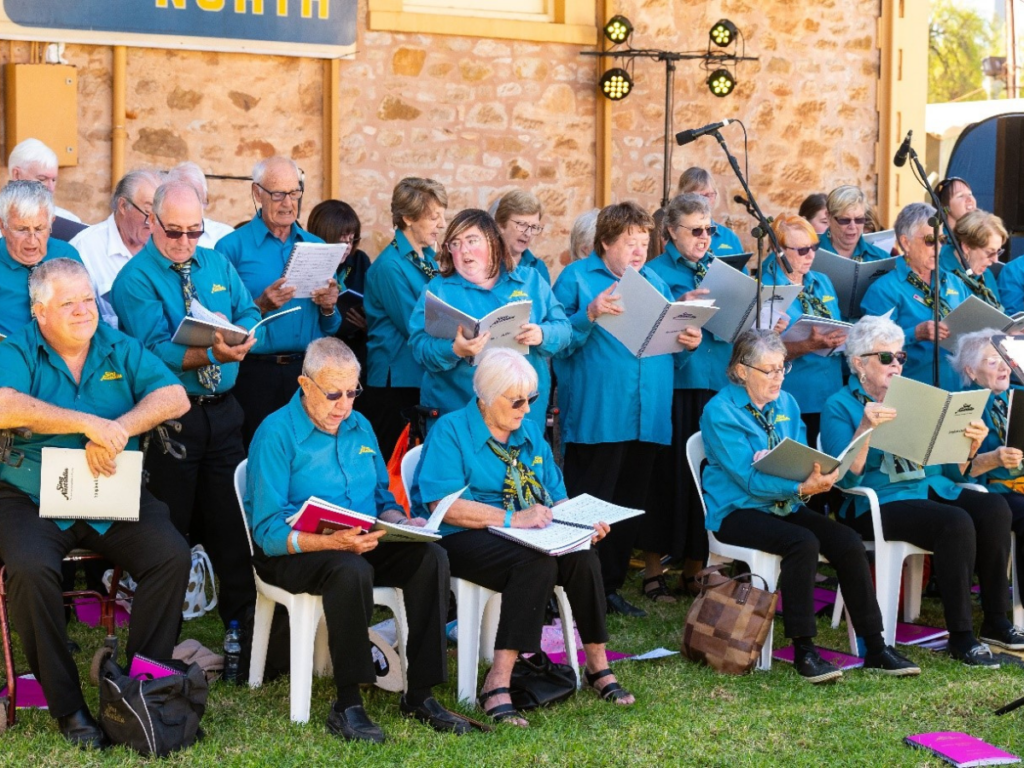
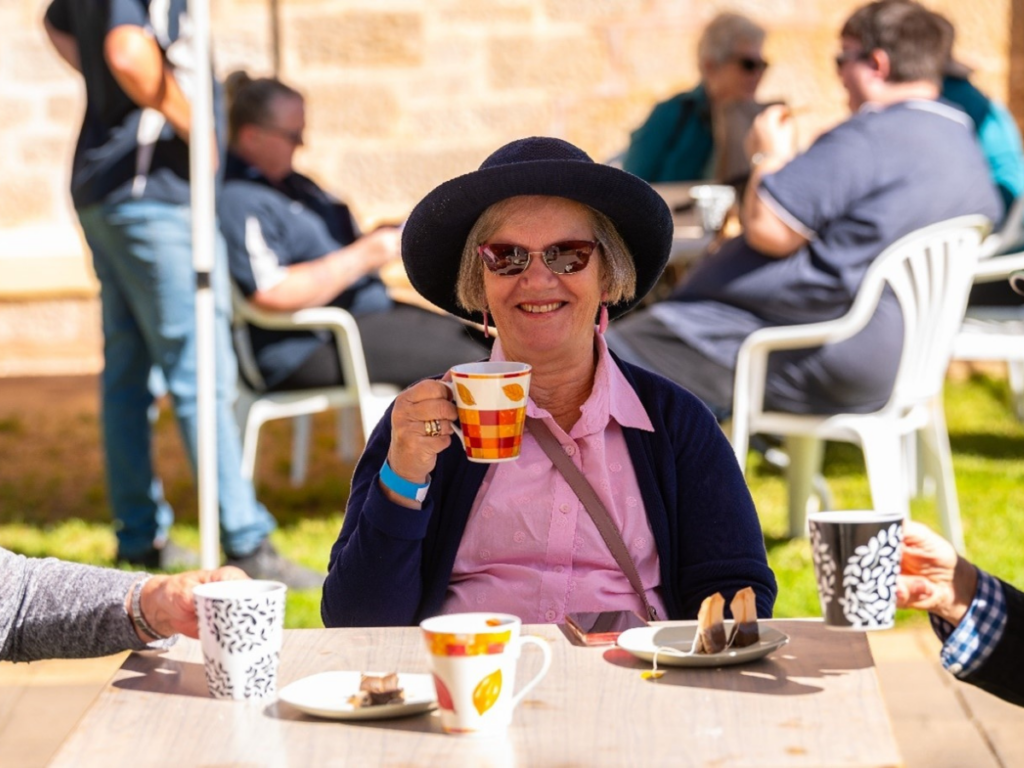
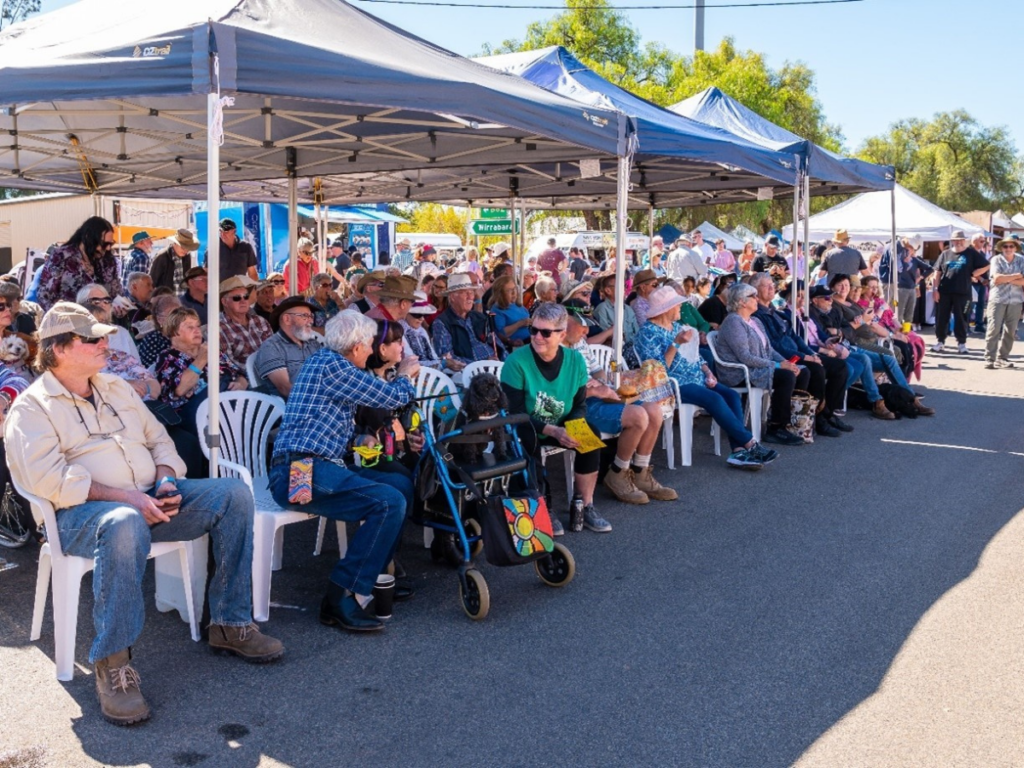
Events such as the Laura Fair are allowing regional, rural, and remote communities to heal and reconnect after the uncertainty and disconnection caused by COVID impacts and are vital to the social and mental recovery of residents.
The chairs purchased with the funds provided by the RRC program will mainly serve the Laura Fair during their yearly event, eliminating the recurring cost of renting them, as the group estimates the money they have spent over the years would have paid for chairs several times over.
The group has storage space in an existing facility to keep and maintain the seats in good condition. With COVID affecting revenue, this cost-saving measure will allow the group to allocate more funds towards running costs or supporting other local community groups. Additionally, these chairs will be available to other community organisations in the Laura area to eliminate the need for them to pay equipment hire.
The beautiful Mid-North Coast of NSW is Gumbaynngirr country, with 15,000 Aboriginals living across the region. COVID had significant impacts on the health and wellbeing of local Gumbaynngirr women in particular: local services found it difficult to meet the needs of community, while research conducted with Gumbaynnggirr people on the ramifications of COVID reported that the restrictions on social connection had serious negative impacts on social and emotional wellbeing and overall health.
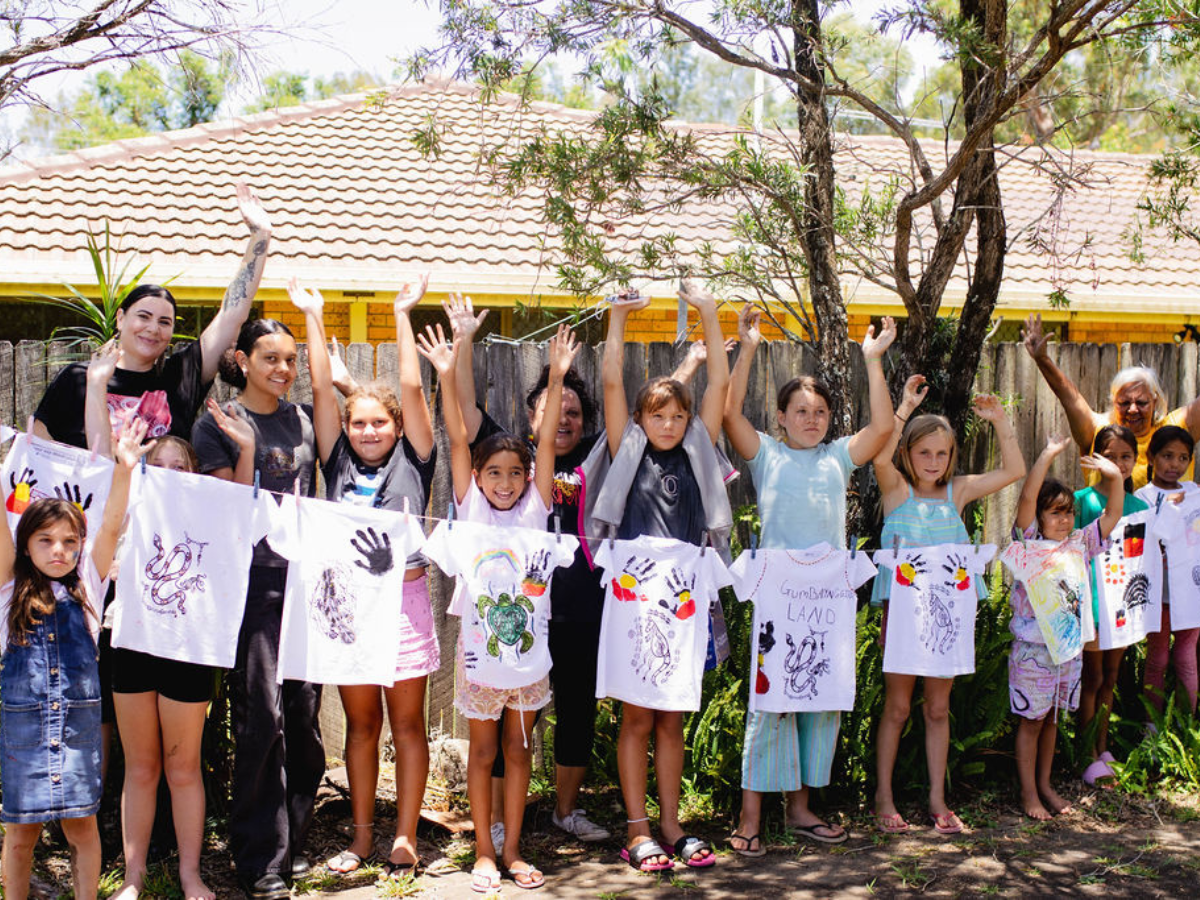
Based in Toormina at the southern end of Coffs Harbour, Happy Boxes Project Ltd aims to alleviate barriers to accessing self-care items for Aboriginal women in remote communities by providing packages of self-care products such as soap, deodorant, and shampoo – otherwise known as ‘Happy Boxes’). Recognising the impacts that COVID-19, Happy Boxes capitalised on their connections to the local community to significantly scale up services and programs at their new community hub: Nyami Gawbarri (Women Gathering).
Nyami Gawbarri was able to support local community members to volunteer their time in the space to pack Happy Boxes for remote communities. Together they were able to pack and distribute 689 Happy Boxes to 22 remote communities throughout Australia. This meant that at least 689 women didn’t have to go without essential hygiene products.
In addition, the Happy Boxes team hired a number of local Aboriginal women to provide programs for hub users and consequently the hub went from being open one day per week to five days, offering programs on topics ranging from cultural meditation, Aboriginal art and cooking, to a five-week program called ‘Mob Radio’ – teaching local teenagers how to be radio presenters.
Critical health services that have traditionally had social barriers to access, such as cervical screening programs, also ran out of the hub. Another outcome of being open five days per week was the creation of an Intensive Support Reintegration Program for teenagers consistently being suspended and disengaged from school. Local schools are now referring their students to Nyami Gawbarri as the organisation can provide a culturally-safe space to spend their suspension, giving back to the local and national communities.
The impact that the project had was described by a local participant:
“The programs for these young women will positively change lives. Providing opportunities for connection and supporting our young women to develop their identity and sense of belonging will have such a huge life lasting impact for them, their families and our Community. Nyami Gawbarri is supporting the development of proud, determined and connected young Jindas.” ~ Anonymous
The level of need for Nyami Gawbarri, and the positive impact that the program of activities over the last twelve months has had for the hub has meant that Nyami Gawbarri is now evolving to become a separate entity and permanent community hub for Gumbaynnggirr women. Critically, throughout this period the project coordinator was able to secure government funding for their role, and hence will be able to continue Nyami Gawbarri’s commitment to provide a culturally-safe space and a plethora of programs beyond the completion of the FRRR-funded project.
Emma Sullings, Chief Executive Officer of Happy Boxes Project Ltd, explains the impact that this grant has had for the hub and the community:
“We are extremely proud of the establishment and succession of a community hub. Nyami Gawbarri stands as a testament to the significance of creating dedicated spaces for women to access a range of services and programs tailored to their unique needs. It is a symbol of community strength, unity and empowerment.”
This inspiring hub has capitalised on opportunity and scaled for the community good – and in the process, showcased how support for locally designed and led initiatives can have long-running positive outcomes. These impressive efforts were supported by a $50,000 grant from FRRR’s Strengthening Rural Communities – Rebuilding Regional Communities program, funded by the Australian Government.
The townships of Loxton and Waikerie are the main service centres in the Riverland of South Australia, around 200 kms north‐east of Adelaide. In 2021, the Riverland was drought declared, with population, economic and environmental challenges evident.
Little Town Productions saw an opportunity to leverage the annual Loxton Lights Up Festival to bring new people to town to boost the local economy, as well as connect and engage locals, while also building skills, especially among the young people in the region, and having some fun.
The District Council of Loxton and Waikerie received a $55,859 Tackling Tough Times Together (TTTT) grant on behalf of Little Town Productions, enabling them to bring their ideas to fruition.
Coinciding with the 30th anniversary of the Lights Up Festival, Little Town Productions created and coordinated a spectacular and innovative illuminated production featuring a unique animated projection mapped to the façade of the historic St Peter’s church. The first of its kind in Loxton and the Riverland region, SHINE ran for eight days in the lead up to Christmas and drew thousands of visitors from Adelaide, regional South Australia and interstate.
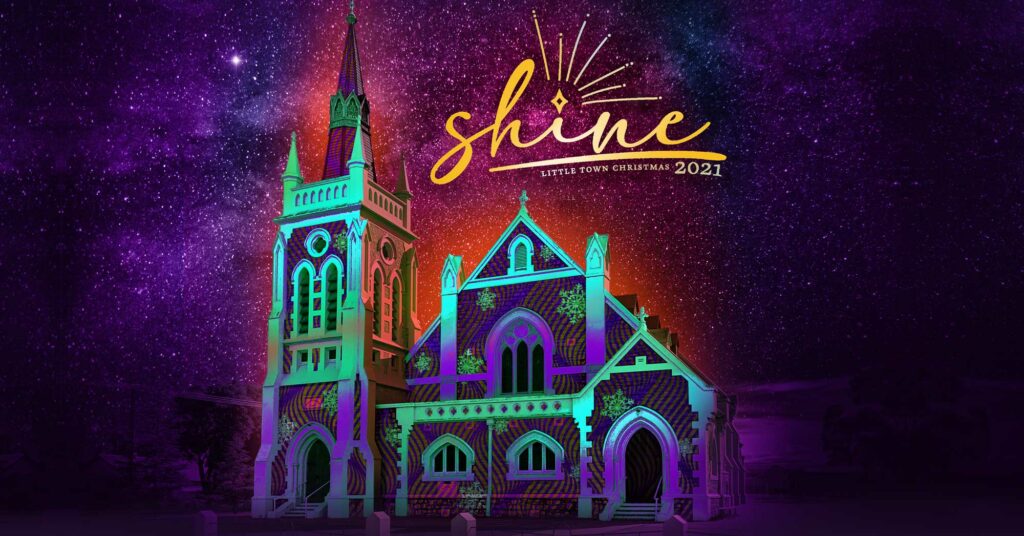
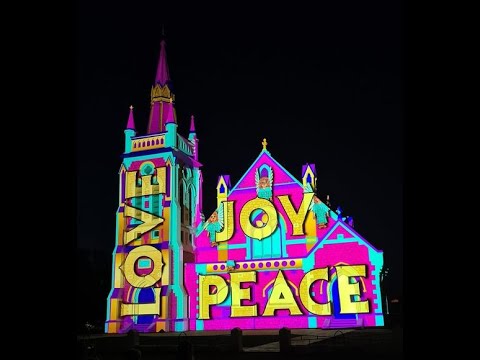
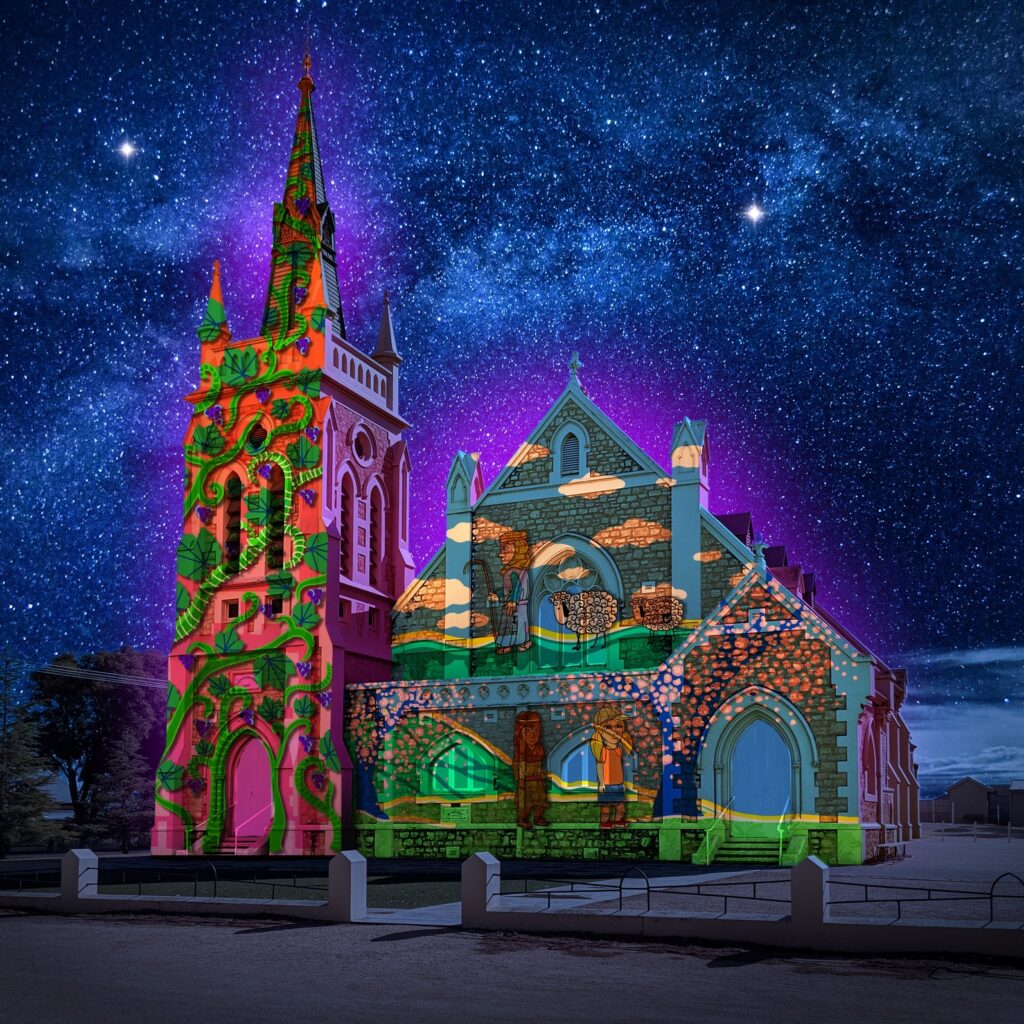
The management team was very focussed on utilising and developing local talent, with a view to building skills and training that lead to career and employment pathways for young and unemployed people. The project provided the opportunity for these people to work alongside a key partner – world renowned illumination creative artists Illuminart, who advised on creative design, direction and animation services, immersive and interactive concepts. They also mentored young people and others in the community on technical and creative installation, and conducted training workshops to help build skills to seek employment in animation, theatre, leadership, music, digital sound and technology and production management.
The creative team was set up and led by a local 19-year-old and included other local artists, musicians and representatives from Loxton High School. Several year 11 and 12 students, and their teachers, played a key role in creating the animations, projections and filming of the event. Five of the seven artists who created the background illustrations for the animation were from the Riverland, and three of these were from Loxton. With input from the creative team, two 2020 Loxton High School graduates undertook the storybooking of the animation, working closely with and being mentored by Illuminart animators and illustrators. They were both subsequently offered contracts with Illuminart to work on similar projects while at university.
The local input extended to the music, with all the music in the production composed and recorded by Loxton’s Karyn Skewes. Others involved included the Loxton Community Choir and the Lead Principal of Opera SA. Many of Loxton’s service clubs, community groups and residents were involved and contributed in various ways, including an enthusiastic group of older ladies who created a floral display inside the church, one of the key venues. Artworks related to the project, as well as other art produced by members of the local community, were displayed in Peace Hall on all the nights of SHINE, showcasing the amazing talents of the community.
All this work was captured by Six Foot Productions, who worked with and mentored the town’s young people to create a mini-documentary of the project from start to finish, with behind-the scenes footage capturing the passion and enthusiasm of all involved. The file was posted online a week after the event, reaching 30,000 people, with 12,700 views on Facebook, 264 likes and was shared 89 times.
The TTTT grant, which was funded by the Australian Government, contributed to engaging local companies to provide event equipment – audio, filming, lighting, security, event hire, container and marquee hire and contributed towards creative design by Illuminart.
Andrew Waters from DCLW said that there was no doubt that SHINE was an outstanding success, both for the local community and for the people it drew to the town to celebrate the 30th anniversary of Loxton Lights Up. While COVID presented challenges with restrictions, capacity limits and check-ins, it wasn’t a huge factor, given the event was held outside. A plus to come from it was that the organisers were able to obtain a relatively accurate count, with the registration app indicating that more than 6,000 people were present within the church grounds during the eight days of SHINE!
Andrew said, “On the final two nights we reached a near COVID-capacity of 1,000 people at any one given time. Total numbers on these nights would have been greater, as people came and went throughout the night. The project provided new opportunities to showcase the talents of local artists, musicians, actors and dancers and provided greater opportunity for the community to access the arts… a visual and auditory masterpiece.”
Beyond this, the project addressed the economic decline and disadvantage brought about by extended drought conditions across the Riverland Region. It was a celebration of creative and cultural experiences that are the lifeblood of the region, and was a key driver in re-activating the Riverland arts and entertainment industry. The project directly benefitted the region’s businesses that had been economically impacted by drought, injecting an estimated $1.8M into the local economy and creating new jobs in hospitality, retail and the arts.
Located in the picturesque Colac-Otway Shire, Colac Makers’ Space provides a workspace for regional artists and undertakes community engagement with the arts. ReGenZ is a youth arts group run in partnership between Colac Makers’ Space and the Colac Youth Health Hub.
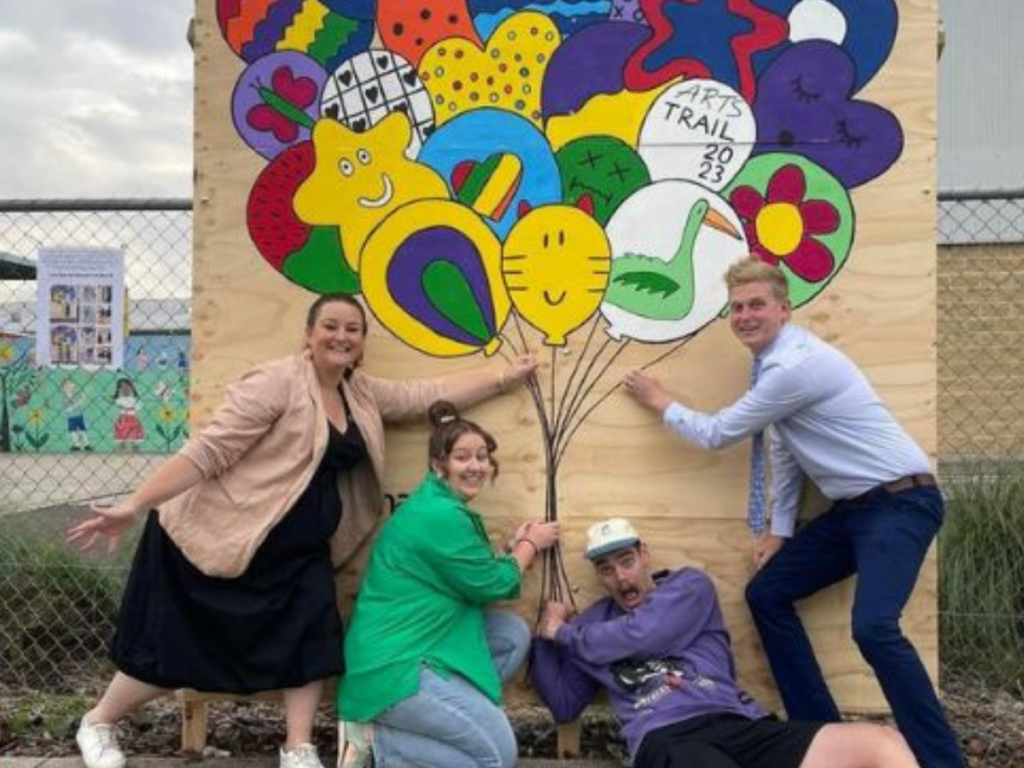
The group attracts significant numbers of young people to its activities, particularly LGBTQIA+ youth who see this group as a safe space in a community where their options for organised support are limited. Support for this cohort of youth is critical, given the rise in youth mental health issues since the onset of the COVID-19 pandemic. The group is one hundred percent volunteer-run, and like many other organisations, Creative Otways and the Colac Makers’ Space were facing significant hurdles post-COVID-19, with volunteer burnout colliding with increased need amongst youth.
To meet this increased need, and in the context of ongoing volunteer pressures, Colac Makers’ Space embarked on a new project. By hiring a professional artist as a mentor to teach skills in various art forms including drawing and sculpture, supporting them in life skills and accessing pathways to work in the arts field, the program provided deep engagement for the youth participants of ReGenZ, while providing some relief for the organisation’s volunteers. The program was run with support from local mental health services and culminated in an exhibition of the students’ work as part of the 2023 Colac Art Showcase and Exhibition. Flowing on from this, an annual exhibition program will help support the long-term sustainability of ReGenZ.
Lynne Richardson, Project Manager at Creative Otways (auspicing Colac Makers’ Space), highlighted the importance of the project to support local youth and volunteers:
“As a volunteer organisation we struggle with a limited number of volunteers and without this project, our youth Art group could have easily gone into remission as our volunteers struggled with many pressures … this project kept the youth group going and allowed us to deliver more projects which engaged more youth and gave much needed support to both our volunteers and our youth.“
With 15-20 youth attending the program each week, and more than 300 students engaged over the course of the program, Outside the SQUARE- ReGenZ was able to connect like-minded youth from Apollo Bay with those in Colac, allowing them an opportunity to be themselves, be creative and build their confidence. Impressively, 256 of the youth displayed their work at the Colac Art Showcase and Exhibition with other professional and emerging artists, and many were provided prizes of art vouchers to encourage continuation of their arts practice. Wider benefits were also felt by the project, with students from Studio 92, an all-ability arts venue, also participating in the exhibition with the support of the ReGenZ youth: inclusivity and kindness were on display as well as art works in Colac-Otway Shire!
Colac Makers’ Space was also able to capitalise on opportunities as they arose. The initial plan was for a well-known local artist, Reuban Whyte, to provide the mentoring role, however he took up a new position as the youth engagement officer at the Colac-Otway Council. The project was able to hire another local artist, Jodie McGill, to undertake the mentorship role while also engaging Reuban in an in-kind capacity through his Council role – meaning the youth had two mentors for the duration of the project – double the benefit for ReGenZ!
Auspiced by Creative Otways Incorporated, Colac Makers’ Space successfully applied to FRRR for a $10,000 SRC Rebuilding Regional Communities grant, funded by the Australian Government, to support this project.
In March 2021, the Hawkesbury-Nepean region on the NSW Central Coast was hit with major flooding, affecting low-lying areas along the river. The flood caused major disruption and many of the lower lying areas were home to some of the most socially vulnerable members of the community. The situation was exacerbated by the fact the floods followed the 2019/20 bushfires, February 2020 flood and COVID. This meant the community had little resilience to respond when the March 21 flood came along.
While there were many issues that emerged, four smaller, more remote communities experienced particular challenges, as they had limited, if any, mobile or internet coverage and are located away from centralised services. This impacted the communities in accessing supports to assist in their recovery journeys, using internet and online platforms.
The Hawkesbury City Council plays a pivotal role in recovery and preparedness in the region and identified this as an issue.
They received a $14,836 grant through FRRR’s Rebuilding Futures program, funded by Suncorp Group, to have accessible technology established in community hubs across these four remote areas – Bilpin, Colo, St Albans and Wilberforce.
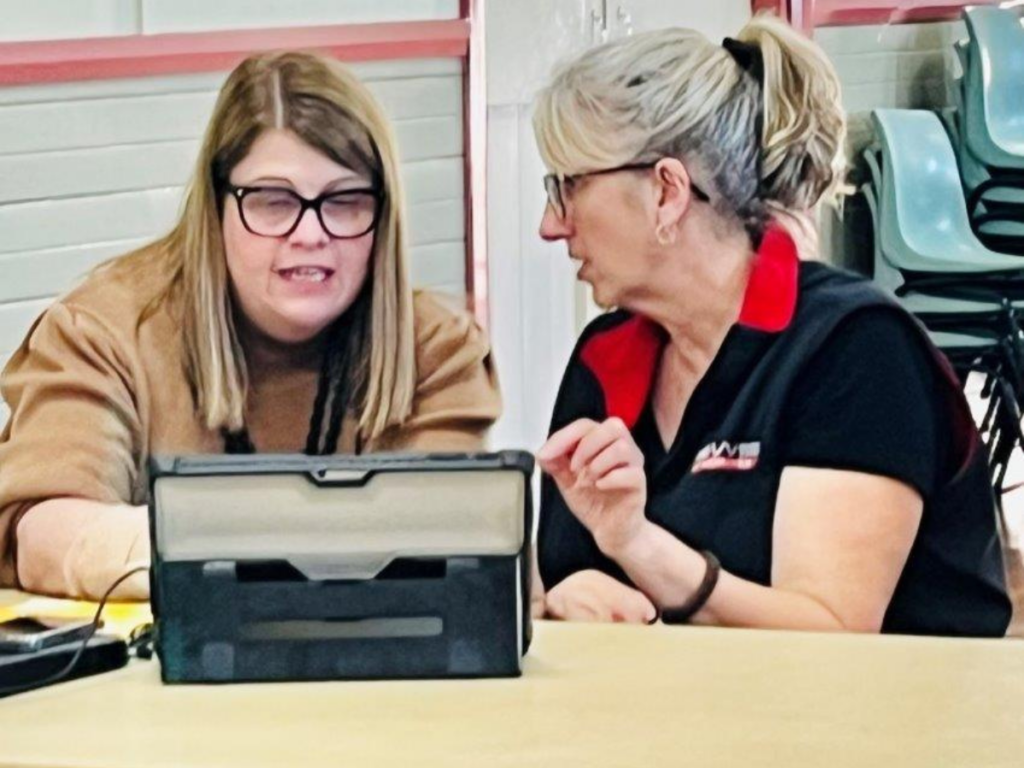
The Council used the grant to purchase IT infrastructure such as laptops, tablets, projectors, screens, cameras and associated software. They also improved the internet connection into these four hubs using satellite hardware, installed via co-contributed Council funds. The Council used their existing relationships with community leaders, organisations, citizens groups and emergency services to make sure that the grant resources went to the people who needed them most.
The overall result was improved community access to technology, allowing community members to connect with each other; access online appointments and government portals; and connect with recovery and community support services.
An additional benefit is that users can also access ‘tech-savvy’ Council staff who work in these community hubs four days per week. These staff members share their knowledge and ability with technology through training and support to lesser-abled community members. Further development has seen the evolving partnership with the library team, Department of Primary Industries and the Digital Literacy Foundation providing further training on topics such as online safety, flood recovery agronomy, and digital literacy topics, respectively.
The ’silver lining’ of implementing the project during challenging times, as noted by Council staff member Liz Murphy, is that this grant has enabled them to contribute positively towards ongoing, sustainable change in the community. The effects of this grant will continue to be felt long after this grant has been expended and has attracted additional support for the community.
Originally a resting place for passing drovers, Foster is a small town just north of the Gippsland coast. Like much of regional Victoria, Foster was hit hard by COVID, with long-lasting economic, health and social outcomes. Impacts on social connection, the need to provide food relief for the community, and the reduced ability for community groups to fundraise were all felt strongly by the volunteers at Manna Community Garden.
Established 22 years ago, Manna Community Garden strives to improve food security and social wellbeing in the community. Working closely with Manna Gum Community House, community lunches are held and meals are provided for people in need of support. Demand for these lunches and meals was heightened during the pandemic and continues today, with the need exacerbated by escalating cost-of-living pressures. The two organisations also work together to provide assistance and information via workshops on topics such as grafting and seed saving, and a community stall at the local farmers’ market.
The fire pit in the gardens is an important gathering place for community members. The facility hosts the local youth group, community lunches, evenings in the garden events and NAIDOC week activities.
Before the pandemic, fundraising efforts were underway to pay for desperately needed upgrades to the Manna Community Garden, including to the garden beds and the amenities around the fire pit. A large Christmas in July fundraiser had to be cancelled two days before it was due to be held due to lockdown orders and while local sponsorship allowed the garden upgrades to go ahead, the works around the fire pit remained unfunded. The seating was dangerous and needed replacing if the gardens were to continue to provide an important social space for the community.
The volunteers at Manna Community Garden applied for an FRRR grant to supplement their fundraising strategy and allow them to continue with these much-needed works. Through an Australian Government-funded SRC Rebuilding Regional Communities grant for $2,600, the fire pit seating was able to be upgraded. The community of Foster is now able to safely enjoy the gardens as a space to socialise, come together, learn and provide food relief for the town.
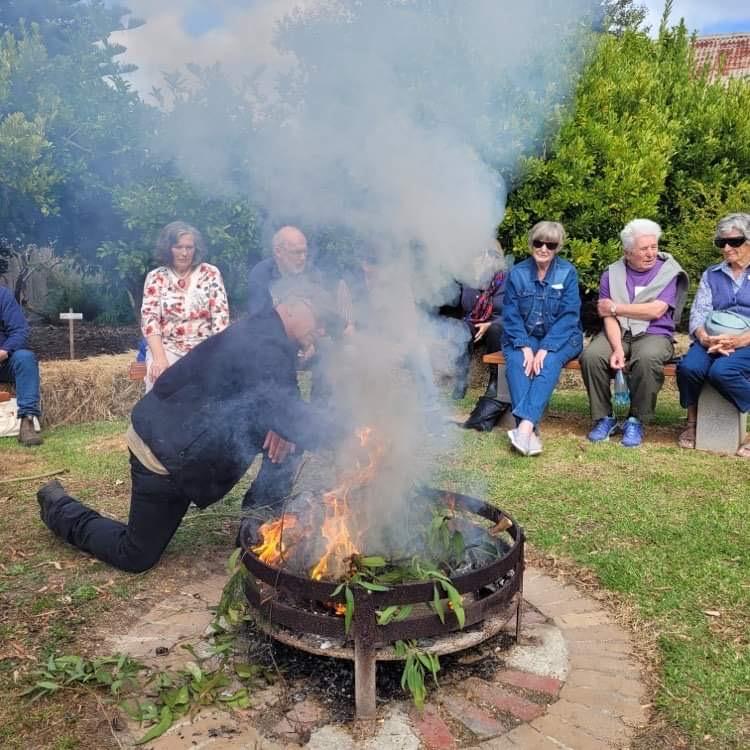

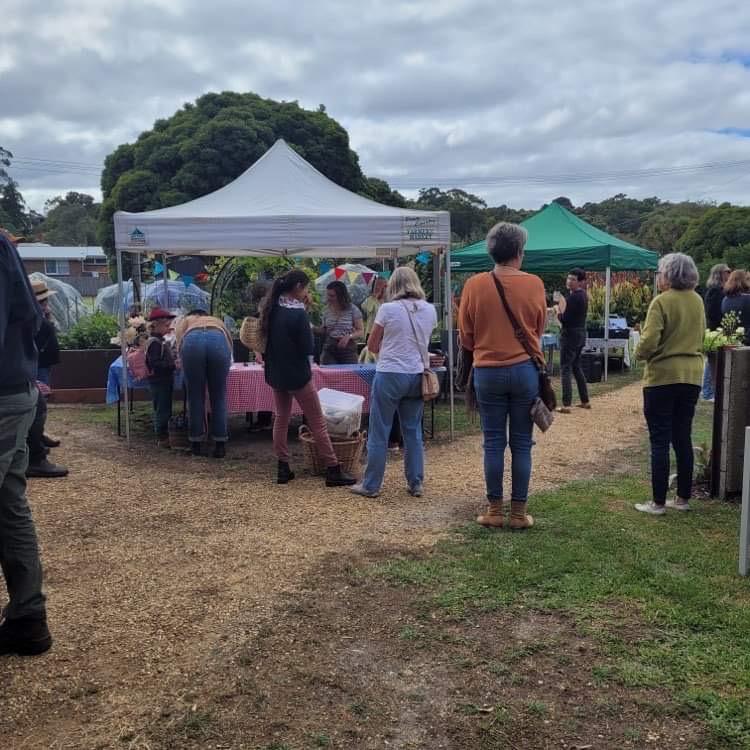
President of Manna Community Garden, Ms Juneen Schulz, explained the importance of the garden upgrades for reconnection:
“The space has provided a beautiful location for members of our community, especially our garden group, to connect. This is particularly important in the recovery from COVID-19, as it gives us a safe space to be together and rebuild our community.”
With the easing of COVID restrictions, Manna Community Garden has since joined together with other community gardens in the district to run annual events, bringing the wider South Gippsland and Bass Coast communities together and celebrating the benefits of growing locally. The first event, held in Foster in the newly renovated garden, attracted 60 guests and included workshops, guest speakers, and of course lots of beautiful locally grown produce!
“We wanted an inclusive day where community gardens across our slice of the universe could come together and discuss our favourite topics – growing food, looking after our hamlets and communities, sharing our knowledge.”
The neighbouring town of Meeniyan will host the next event, in what is hoped will be a long-running tradition – supporting communities that were badly impacted by COVID-19 to come together and encourage the health, economic, environmental, and social benefits of growing produce locally.
The work of Manna Community Garden shows that a small project can have a big, and long lasting, impact!
While it had a short life as a gold mining area, the Tanjil Valley in eastern Victoria is a long established dairy farming area with a keen local History Gatherer’s Group.
The Group brings together older people from across the district to share family stories and evoke long forgotten memories of farming techniques and innovations. These evenings, held at the Hill End Community Centre (HECC), are very popular and the social interaction contributes to a strong sense of community belonging and connectedness.
As the elders in the settler families age, their families, as well as more recent community members, were keen to preserve and capture their local history. Some short stories have been shared in the free monthly ‘Hill End Herald’ community newsletter, which is distributed to almost 500 families throughout the Tanjil Valley. The community always responds positively and people urged the Group to collate their histories into book form. So, some local historians got to work, extending and gathering these stories into a manuscript.
With a $3,400 grant from the Gardiner Dairy Foundation Community grants program, the History Talks – Settlers’ Histories A Generation On was collated and published.
By all accounts, the collation of the book was a monumental effort! It hardly needs saying that COVID presented a major challenge, especially as the contributors to the book were mostly older community members for whom the risks of COVID were great. The authors themselves are older people with significant health challenges, who live in different towns, yet these two women determinedly worked together to get the project finished. All the final checks and corrections were done by phone or by emails and, as the two authors also live in different towns, they had to do all their final editing in the same way.
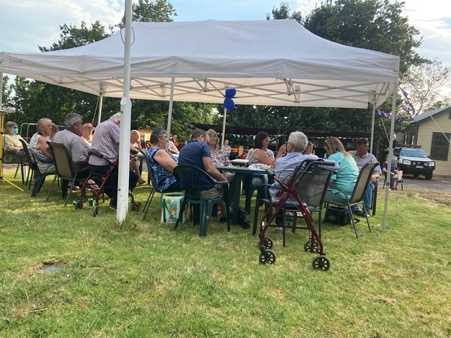
The book launch occurred at the Australia Day 2022 community event to great acclaim. Despite COVID risks and stormy weather, which did affect numbers at the event, nearly 80 copies were sold on the night. The book, which features stories from more than 30 district families, and cover art by well-known local artist Liz Bowley, has been featured in The Hill End Herald, and mostly sold through word of mouth. The book has almost sold out in the four months since it was launched and the group is planning a re-print.
The authors generously handed over the ISBN and all the books to the Community Centre to sell and to use all the profits for the benefit of the community centre.
In acquitting their grant, Hill End Community Inc. told us how proud they are of the authors’ efforts to push through the restrictions of COVID to produce the book.
“We are also proud of the commitment of the contributing farmers and their families to provide information and search out their historical family photos. We are proud too of the contribution the book has, and continues to make, in documenting the history of the settler families of the community and sharing that with the broader community and newer community members.”
For the elderly members of the monthly History Gatherers Group, the book project reconnected them after two years of being shut down by COVID restrictions and fears. Tanjil Valley Settlers’ History will ensure that the farming histories of this district will not be lost as settler families age but will be preserved, celebrated and shared for years to come.
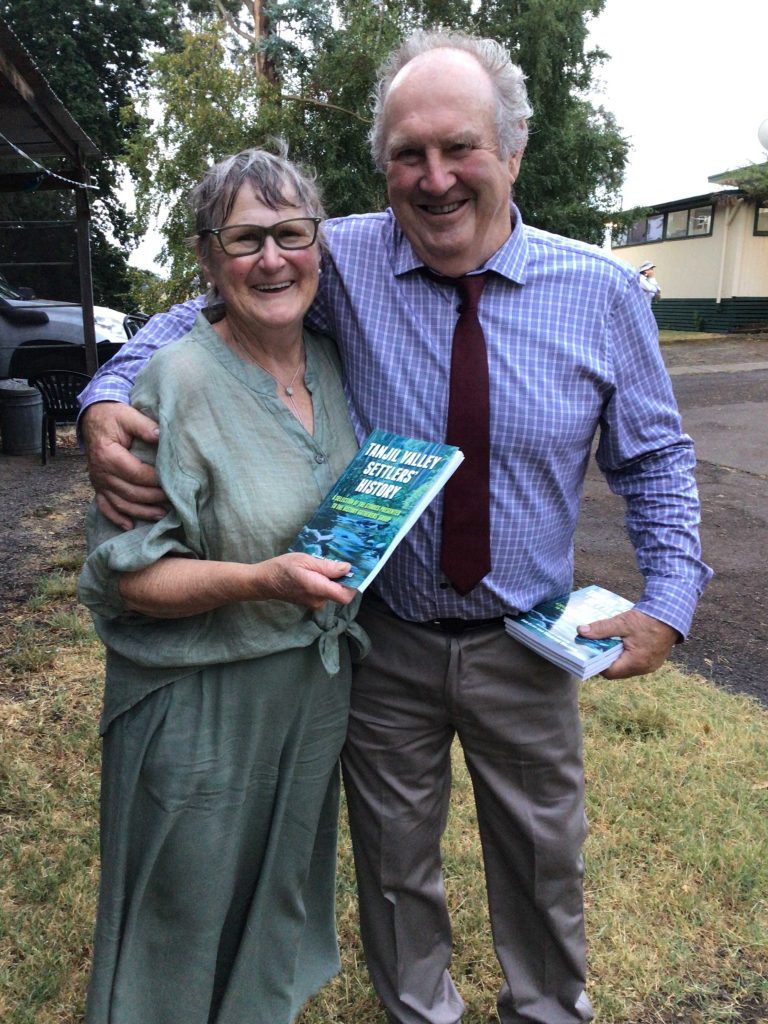 Book authors Mrs Christina Williams with Mr Lu Cervi who conducted the book launch.
Book authors Mrs Christina Williams with Mr Lu Cervi who conducted the book launch.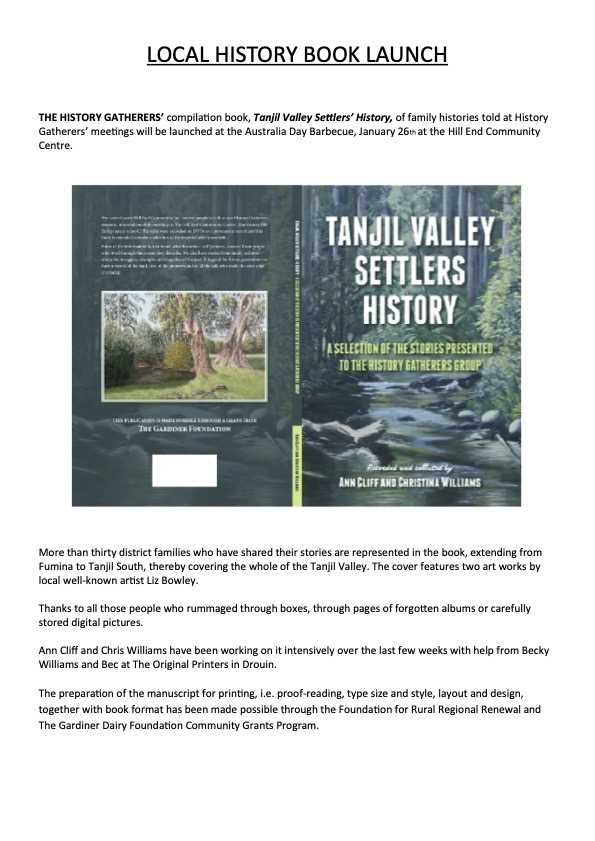 Flyer advertising the book launch.
Flyer advertising the book launch.
The population of the District Council of Yankalilla is 5,500, spread across 750 square kilometres within 10 small townships. Some families are geographically isolated, farmers are doing it tough and there are a number of people who are struggling with low income, drug and alcohol issues, as well as family violence. There are not many opportunities for work and no public transport options for those who don’t have a car. While some support services are available in the community, most are outreach and not located in the district. In general, anxiety levels are higher than normal across the population groups. COVID fears and restrictions have added to this anxiety. Community members who are struggling usually want to connect with someone in their district to talk things over and find out what support is available.
The Council’s plan was ambitious – establish the Fleurieu Coast Community Network (FCCN) to foster help-seeking practices and build community connectedness and strength, with a focus of improving mental health. They successfully applied for a $9,000 In a Good Place grant from FRRR, funded by CCI Giving, to launch their plan to engage a coordinator who could provide the ‘first point of contact’ role and upskill community champions to expand the service across the district.
On paper, it was straight forward – set up a network of service agencies and community organisations, create a calendar of events focused on mental health and wellbeing messages, host informal community conversations and support community leaders, by providing them with mental health and wellbeing training. What they didn’t expect was COVID and local restrictions, which changed the planning and execution of all elements of the project plan. But each hurdle was successfully negotiated.
Meetings to form the Fleurieu Coast Community Network (FCCN) were held in a blended format. They received excellent feedback and became very popular within the sector. The Network is now well established, with high levels of information sharing and collaboration across the core group of about 22 organisations, which includes more than 70 service providers, businesses, local agencies and individuals who receive regular updates on FCCN activities and come together to connect, identify community issues and mobilise resources to provide information, advice, support and training.
The original concept of an event calendar was very time consuming to deliver and was not engaging as many people as the organisers had hoped. A decision was made to embed the events and activities within the Council’s web-based calendar and event information is also shared in digital flyer format through the Network emails.
Community conversations were held bi-monthly. This group was facilitated by Skylight Mental Health and themes discussed included community wellbeing during COVID and suicide prevention support. As a result of these conversations and other events, 14 individuals registered as Community Leaders; people who could be called upon by local community members when they needed information or just a friendly conversation. They are seen as a stand-by informal ‘Crisis Response’ group – people who are willing to do what is needed when the situation arises. So far, there has been a food delivery response for people isolated due to COVID or anxiety about COVID, as well as informal support for low income parents.
Because of travel restrictions, the planned community presentations and training offered had to be redesigned. The Network partnered with Country SA Primary Health Network to conduct the Fleurieu Coast Wellbeing Expo, which was very well attended by locals. They also supported the local Gone Fishing Day, which focused on mental health and was attended by more than 80 people; Lullabies of the Fleurieu 2022 for parents engaged over 100 people; No Scaredy Cats for Parents supported 10 families with children experiencing anxiety; and the Now and Next Program for parents of children with a disability.
Excitingly, the Council funded the program from 1 January to 30 June 2022, due to the successful pilot and the impressive involvement from service providers and Community Leaders. This allowed the Project Officer to sustain the momentum and goodwill of the FCCN and facilitate Accidental Counselling Training for Community Leaders.
Claire Taylor from the District Council of Yankalilla said, “This grant has been so influential in assisting our Community Team to establish and consolidate the Fleurieu Coast Community Network. It allowed us to demonstrate that the Network is truly valuable in a small regional district where we have to rely on good connections and relationships to maximise the access to services for our residents.”
For 33 years families from Singleton and surrounding areas experiencing life challenges – from domestic violence to anxiety in young people – have been coming to Singleton Family Support for therapeutic counselling, family capacity building, education and wellbeing programs.
Situated on the banks of the Hunter River, Singleton is in NSW, some 197 kilometres north-north-west of Sydney. A major coal mining centre, the rural region has limited public transport options, a transient and often isolated population linked to the mining industry and limited support services.
Supporting this community, Singleton Family Support Services has a passionate, capable and qualified team of professional workers. Together, they offer support to more than 50 families in a one-to-one setting and approximately 30 individuals in a group setting at any given time.
Since the COVID pandemic and critically in the last few months as restrictions have eased, the Service has been inundated with referrals from individuals, families and other service providers. Over the last six months, referrals have increased more than 50% on the same time the previous year. The Service’s ability to refer onto other professionals, such as GPs, Psychologists, Housing services and Mental health providers, has also been impacted, with many professionals’ books closed and long waiting lists. This has placed a significant strain on the Singleton Family Support’s ability to respond to each referral appropriately. While there are many issues and people needing support, the Service is particularly concerned about the mental health of young people. COVID created a pandemic of anxiety and uncertainty with this group. There are no youth-specific mental health services in Singleton.
A $49,500 COVID Regional Community Support Program grant, funded by Resilience NSW, will allow the service to increase staff time. This equates to 80 additional referrals to Family Works, including 10 additional counselling places for youth. An additional six support groups can be offered to the community and it means further support for the organisation’s wellbeing programs. The funding reduces the pressure on the organisation. For families, this will mean timely assessments of the family’s needs, earlier interventions, greater access to counselling, educational programs and support groups, building awareness in parenting theories, domestic and family violence and mental health. This will all lead to increased family capacity to build resilience and safety for children and families.
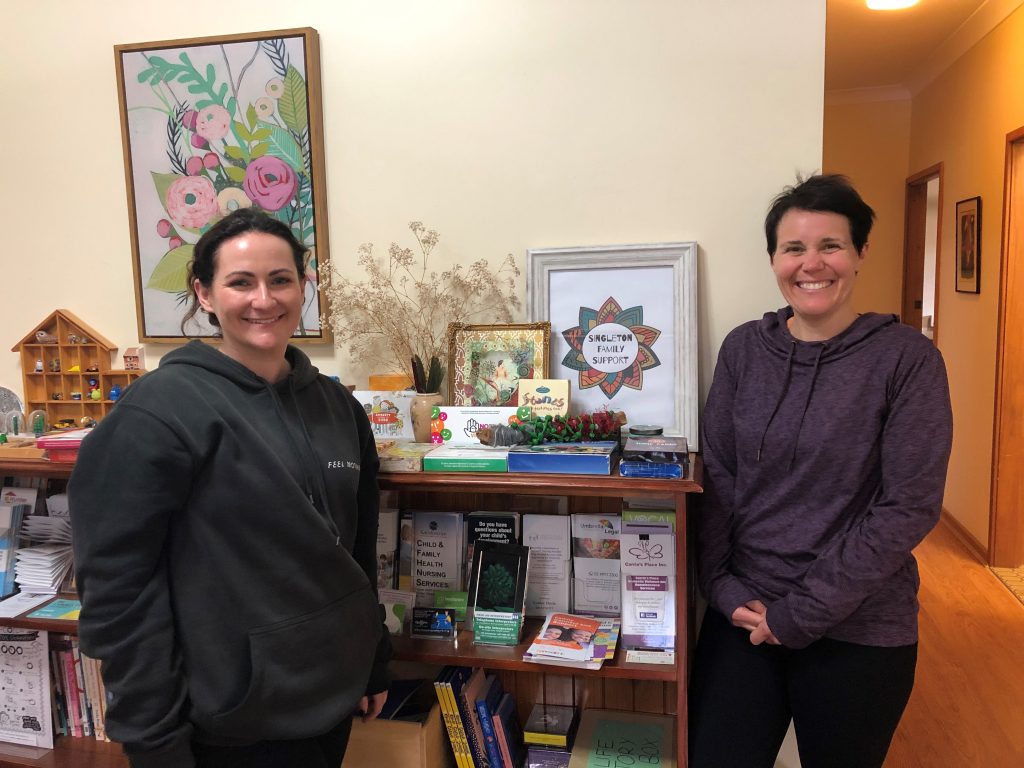
The NSW / VIC border towns of Albury / Wodonga and surrounds were severely impacted by the cross-border lockdowns during COVID restrictions. THose who live in these adjacent communities consider them one town, yet community members were unable to cross the border unless there was an extenuating circumstance. That meant families were unable to support isolated elderly family members and those living in challenging conditions, and this was exacerbated by the devastating effects of the Black Saturday bushfires which also affected the community.
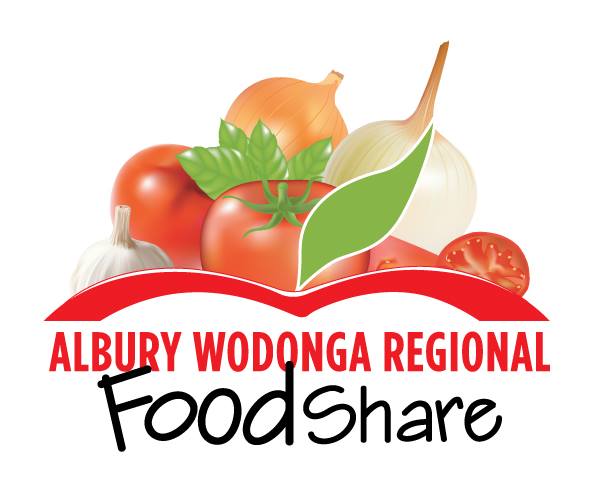
The COVID Regional Community Support program, which was funded by the New South Wales Government and delivered by FRRR, was designed to support community groups and associated volunteers that incurred expenses in delivering food and personal care items to individuals and families affected by COVID lockdowns, by contributing funds to support ongoing service provision.
One such organisation to benefit from this program with a reimbursement grant of $13,500 was Albury Wodonga Regional FoodShare, who has supported those in need in their community since 2011, and their response to the COVID-19 pandemic was remarkable.
FoodShare commenced their Community Pantry program in 2020, which enabled food hampers to be delivered directly to members of the community. To alleviate some of the hardship experienced by families in the region due to the long-term impacts of COVID and cross-border lockdowns, they also coordinated two local pop-up hamper drive-throughs in September 2021, which provided 300 families with emergency food relief.
During the peak of the COVID outbreak, 1,200 food hampers, including culturally appropriate ingredients, were distributed locally across the region. More than half of these were delivered directly to local homes as part of a coordinated COVID emergency relief effort.
To facilitate the immediate increase in demand for FoodShare’s services, operations were extended to seven days a week. This put a strain on resources, particularly on volunteers, but was necessary to keep the community safe. On average, 30 households received hampers each day, and in many instances, this doubled on occasions during the peak of the local COVID outbreak.
To provide specialised support for culturally and linguistically diverse (CALD) communities, FoodShare was supported by local organisations such as Albury-Wodonga Ethnic Communities Council (AWECC) and Murray Valley Sanctuary Refugee Group. These agencies took enquiries from CALD households who were in isolation due to the COVID outbreak. These agencies also assisted by nominating culturally specific ingredients and in some instances. their volunteers purchased additional food items and delivered these to the CALD households.
In addition to delivering hampers to local residents, FoodShare was also asked to deliver food and personal care hampers to various locations where people had been forced to isolate in accordance with Health Orders, including Rutherglen Hotels, Howlong and the Albury Caravan Park. Over 4,500 kilometres were logged from October to December last year on just one of the FoodShare vans, which was dedicated to supporting COVID operations. To support the heightened increase in demand, an additional van was also hired in November to support delivering hampers to COVID households.
This is a wonderful example of the critical role that so many local NFPs played, and the way in which they collaborated with other groups to support their community. FRRR is pleased to have been able to support this program and help the NSW Government to reimburse FoodShare for some of the costs incurred in supporting their community.

